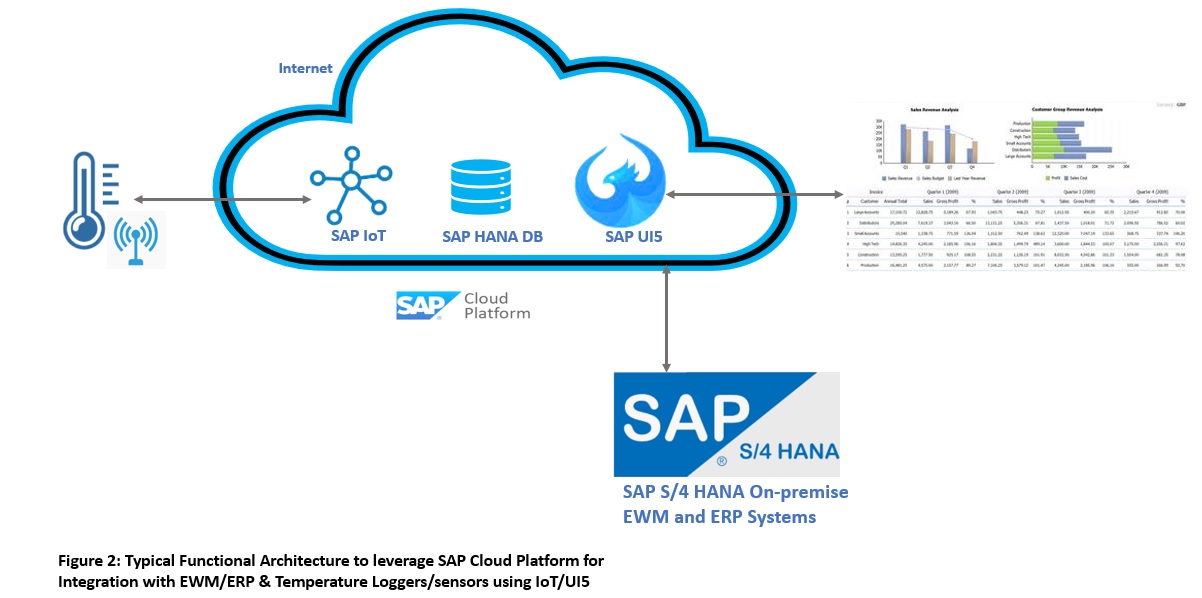Overview
Financial Institutions and healthcare players are now gravitating to cloud to achieve cost optimization and reduced time-to-market as key strategic business drivers for any greenfield or brownfield ERP product implementation programs. The same holds true for Oracle’s Oracle Utilities Application Framework (OUAF) based products, including Oracle Revenue Management & Billing (ORMB).
To take strategic advantage of cloud capabilities for enterprises, ORMB is available as a Software-As-A-Service(SaaS) cloud service, in both Financial Services and Healthcare domains, powered by reporting and analytics and hosted on best-of-breed Oracle Cloud Infrastructure (OCI) services.
ORMB Cloud Service Versions And Domains
The current available ORMB cloud service versions as of date hosting ORMB On-prem versions are as follows –
- ORMB Cloud Service v8.0 – Functional features correspond to On-Prem ORMB v2.9.0.1.0
- ORMB Cloud Service v8.1 – Functional features correspond to On-Prem ORMB v3.2.0.0.0
The following ORMB cloud service versions are available for respective domains –
- Oracle Financial Services Revenue Management and Billing Cloud Service – applicable to financial institutions
- Oracle Insurance Revenue Management and Billing Cloud Service – applicable to Healthcare domain
The Cloud services are available in various scalable deployment options on subscription basis(pay as you grow), based on “Hosted $M in Application Annual Revenue(AAR)” or “Aggregate Bills” or “1K Hosted Insurance Plan Members” (specific only to ORMB Insurance SaaS cloud).(Note-Please refer to “Service Descriptions” section for further details)
ORMB Cloud Service Hosting Deployment Architecture
A typical ORMB 3-tier High Availability (HA) and scalable deployment consists of a web application server hosted on Oracle Weblogic cluster, batch servers with set of Java Virtual Machines in clustered mode using Oracle coherence , and Oracle Real Application Cluster (RAC) based database server.

Reporting and Analytics
ORMB Cloud service provides canned reports for reporting. However, customized reports can be developed by customer using preferred choice of BI tool via data extraction from ORMB Cloud service, with appropriate filters and formats, with incremental and full loads. The recommendation is to use analytics on PaaS, which gives greater flexibility to customers for extending the DWH data models and visualization.
Following options are available to provide data out of ORMB Cloud service for reporting and analytics:
- Option 1: ORMB Cloud Service offers a Data Extractor module for extracting data out of ORMB cloud service in CSV format. Once data extracted, customer pulls the extracted data from SFTP server using private key authentication.
- Option 2 (Preferred Option) : ORMB Cloud service also provides real time data synchronization on Oracle PAAS using Oracle Golden Gate. Customer can extract data from PAAS to on premise analytics tool/DWH or may choose to go with Oracle Analytics Cloud Service for reporting and analytics.
- Option 3: This option allows replication of data from PAAS to On premise analytics tools using Golden Gate Cloud Service.

ORMB Cloud Service- Instance hosting Options
ORMB Cloud Service hosting is provided in single tenancy having two Environments provisioned per Customer Deployment as default : Production and Non-Production.
Notes
- Additional environments like “Non-Production” (use cases include Dev, UAT or training environment) and/or “Non-Production Expanded” are available for customer on additional cost. Both these environments are out of scope w.r.t service levels, disaster recovery and performance targets from cloud services perspective.
- Additional data storage option is available for purchase for both Production and Non-Production Environments on payment of additional fees.
- Data refreshes, from Production environment to Non-Production environments, are available on-demand on customer request, with the condition of one refresh per quarter and sizes of both DB/file storage of the Non-Production Environments involved, should be at least greater than or equal to in size to the Production Environment DB and file storage.
- ORMB Cloud Service, by default, is integrated with cloud-native Identity Cloud Service (IDCS). Customers have the option to either integrate with any existing SAML 2.0 compliant Identity Provider with IDCS or use IDCS alone as both Identity and Service Provider for Web authentication.
- Identity federation for only 1 SAML IDP is allowed for foundation edition of IDCS2 and federation configuration is customer responsibility.

The ORMB Cloud Service – Reporting Option also provides reporting features in ORMB Cloud Service Production Environment and has subscription validity duration same as that of the ORMB Cloud Service Production Environment. The maintenance calendar for both Reporting Option and ORMB Cloud Service Production Environment are concurrent.
- This service includes Reporting DB and Oracle Analytics Server (OAS) along with an Oracle Analytics Cloud (OAC) connection adapter but NOT the OAC instance itself.
- The Reporting option and ORMB Primary (Production) environment are of the same size.
- Any performance related issues for the reports configured on reporting database are to be owned by customer.
ORMB Cloud Service Features
ORMB SaaS Cloud Service includes the following benefits:
- User Provisioning : ORMB Application user provisioning can be done via 3 methods:
- Online Option – ORMB Administrator can login to ORMB application and can create users via concerned UI screens.
- File Upload Option – ORMB Cloud service provides an inbuilt File Upload interface through which user can define the file-mapping configuration and upload the users through batch jobs.
- REST Service Option – This is possible via configuration of REST service to existing identity provider for automatic ORMB user creation on the event of user creation in Customer Identity Provider.
- ORMB Batch Scheduler – Batch scheduling for ORMB cloud service is enabled via Oracle Database Management System (DBMS) scheduler and interactive user interface. The interactive UI is used to define workflows and/or job dependencies along with submission/scheduling, monitoring and administration of Batch Jobs. The Scheduling Methods supported are either Time based scheduling (based on date and time) or Dependency based scheduling (based on job dependencies).

- High availability for business continuity: ORMB Cloud Service Disaster recovery (DR) services provide service restoration capability in event of a major disaster such as loss of data center and ORMB service unavailability as declared by Oracle. Upon Oracle’s declaration of a disaster, Oracle begins the disaster recovery plan to recover production data to the most recently available state to reconstitute the production environments with the recovery time and recovery point objectives.
- Online Integration for real-time data exchange with other systems : ORMB Cloud Service supports REST based Web Services.
- Inbound Services – JWT (JSON Web Token) based authentication is supported for REST services. Customer should have an on premise Authorization Server that supports JWT or they can purchase Oracle IDCS as the Authorization Server.
- Outbound Services: ORMB Cloud service uses Outbound Message Configuration object for outbound service calls. This is a configurable object within ORMB used for calling external system REST services.

- Data integration and transformation: Inbound data integration uses file-based or REST services. For file-based integration, ORMB provides a file upload interface module for data conversion and data integration with the ability to transform and upload files and map file records to Oracle Revenue Management and Billing services. Outbound data integration uses data extracts or REST services.
- Data migration: Configuration Migration Assistant (CMA) involves extensible implementers facility for migrating configuration data from one ORMB environment to another. The application provides more than 125 as-is usage based ,base configuration objects delivered out-of-the-box or as a baseline template for building use case based configuration for concerned implementation.
ORMB Cloud Service Service Level Definitions –
Solution Gate Reviews
Oracle provides 2 Gate Reviews as a part of solution review and go-live as follows:
- Configurations and extensions gate review –
- Oracle provides up to 2 reviews with an overall duration of 14 days to evaluate customers configuration and extensions and validation of best-of-breed solution standardization and mitigating performance risks.
- The first review should only be planned post identification and solution baselining of all extensions.
- If the customer desires a second review, it is recommended to schedule the same post at least one round of integration testing.
- Operational readiness gate review –
- Oracle provides 1 review with an overall duration of 7 days to assess customers readiness of overall ORMB solution for release management to production and post go-live support.
- This is mandatory review to be passed for Operational Readiness for go-live of ORMB cloud service.
Hosting Service Level Targets
ORMB Cloud service has following Service level targets for Disaster Recovery (DR) and System Availability Level –
 Notes –
Notes –
- The Service Levels DO NOT apply in case of Non-Production Environments.
- The Target System Availability service levels are NOT applicable in case of a “declared disaster”.
- The RPO and RTO objectives DO NOT apply in case of customizations or third-party software.
Data Retention

Notes –
- Data or files exceeding the mentioned threshold are deleted from the cloud service.
- Customers can purchase additional data storage for storage requirements as per the retention periods mentioned for corresponding category.
- The ORMB Cloud Service IS NOT intended to store or process any Payment Card data having corresponding data security obligations for such data processing.
RACI Matrix
Under Oracle cloud “shared responsibility security model”, user access/identity and data is customer responsibility whereas application, Guest OS, virtualization, Network, Infrastructure and physical data center security owned by Oracle.

ORMB Cloud Service and Metrics Definitions
Please refer to the latest updated document for the same for both Financial Services and Insurance domains via the link.










This is really helpful. Short and crisp article with a good amount of information.